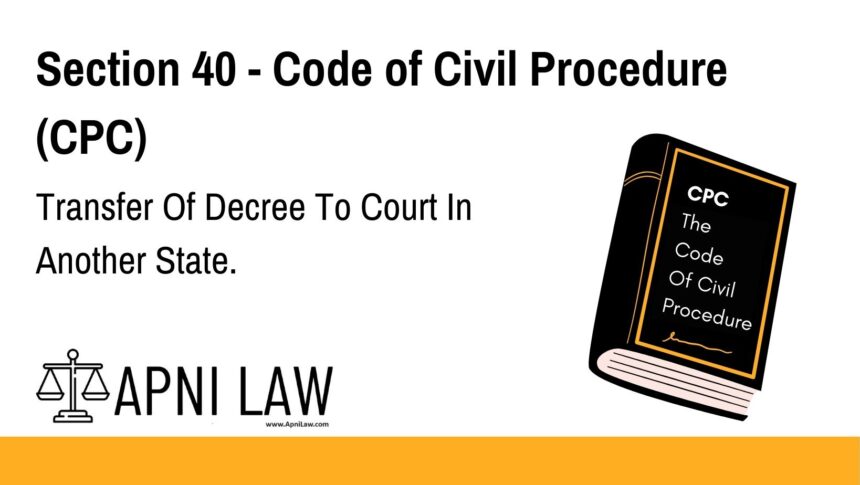Code
CPC (1) Where a decree is sent for execution in another
State, it shall be sent to such Court and executed in such manner as may be prescribed by rules in force in
that State.
Great 👍 This is Section 40 CPC – Transfer of Decree to Another State. I’ll now draft a structured, SEO-optimized article in the ApniLaw format with code, explanation, internal links, examples, FAQs, and conclusion.
Section 40 CPC: Transfer of Decree to Another State
Code
Section 40 – Code of Civil Procedure
(1) Where a decree is sent for execution in another State, it shall be sent to such Court and executed in such manner as may be prescribed by rules in force in that State.
📖 Source: Section 40 CPC – Transfer of Decree to Another State (ApniLaw)
Explanation
Section 40 CPC deals with the execution of decrees across different States in India.
- Under Section 39 CPC, a decree may be transferred from one Court to another Court of competent jurisdiction.
- Section 40 provides the special rule when the decree has to be executed outside the State in which it was originally passed.
Key Points:
- The decree must be sent to the appropriate Court in the other State as per that State’s rules.
- Execution shall follow the procedure prescribed by the local rules of the transferee State.
- This ensures federal harmony and smooth inter-State execution of decrees.
- The transferring Court has no control once the decree is sent; execution follows the transferee State’s Code of Civil Procedure rules.
This provision ensures that decree-holders can enforce their rights even if the judgment debtor or property is located in another State.
Illustrations
- Example 1:
A decree for recovery of money is passed in a Court in Uttar Pradesh. The judgment debtor owns immovable property in Rajasthan. The decree must be sent to the competent Court in Rajasthan and executed as per Rajasthan Civil Procedure rules. - Example 2:
A businessman residing in Delhi owes money under a decree passed in a Bihar Court. Since he resides in Delhi, the decree may be transferred to a Delhi Court for execution under Section 40 CPC. - Example 3:
A decree for delivery of immovable property passed in Maharashtra cannot be enforced directly by a Maharashtra Court if the property is in Gujarat. The decree must be transferred to the appropriate Gujarat Court for execution.
Common Questions and Answers
1. What is the difference between Section 39 and Section 40 CPC?
- Section 39 covers transfer of decrees generally.
- Section 40 specifically applies when the decree is transferred to a Court in another State.
2. Which Court executes a decree under Section 40?
The transferee Court in the other State, as per that State’s procedural rules.
3. Does the original Court retain control over execution?
No. Once transferred, execution is governed by the transferee State’s CPC rules.
4. Can a decree be executed in multiple States simultaneously?
Yes, if the judgment debtor has properties in more than one State, the decree-holder may seek transfer to multiple Courts.
5. Why is Section 40 important?
It provides a clear legal framework for inter-State execution of decrees, ensuring that debtors cannot escape liability by shifting residence or property to another State.
Conclusion
Section 40 CPC ensures that decrees are enforceable across State boundaries in India. It requires that decrees transferred to another State be executed in accordance with the rules of that State.
This section works alongside Section 39 CPC and Section 41 CPC to create a smooth inter-State decree execution mechanism, protecting the interests of decree-holders.
👉 For more details, visit: Section 40 CPC – Transfer of Decree to Another State (ApniLaw).








